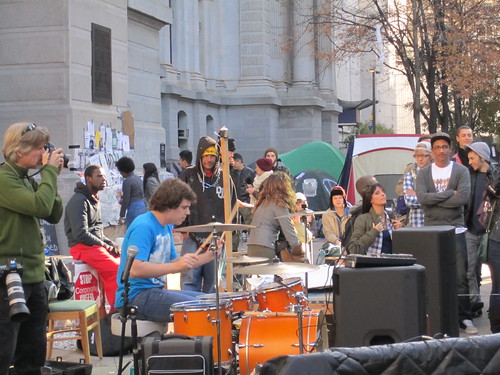
Protesters at the Occupy headquarters use art and music to provide entertainment and comradery.
City Hall is quite the happening place these days. With the Occupy movement spreading across the nation, the community in Philadelphia is becoming more of just that: a community. As one walks around the tent city and they will notice a public library station, a medical tent and one tent labeled “safety.”
There are food and clothing donation centers, a media tent and a booth where protesters can vote on what exactly they want their message to be, since it is still considered by some to be a bit fuzzy.
But one thing that has worked to unite the people of Occupy has been art – visual art, performance art, the art of discussion and learning and passion for what they are doing.
At the site, an open mic welcomes all kinds of performers, from musicians to spoken word and dance, at least five hours a day, and weekends often include more official concerts and information festivals.
“Music gets people involved,” said Andrew Fangmeyer, a musician originally from the Washington area. “It centers people, draws people out and leads to more discussion.
It’s definitely brought some life to the movement.”
Michael Blas is one of the lead organizers of the music collective at Occupy Philly.
“The music is about camaraderie, it’s about becoming a family and working toward a common goal,” Blas said. “When we become a family, then we can make a statement.”
Matt McCloskey, a professor at a nearby community college said the Occupy movement has brought together people who would not normally interact, and has encouraged them to talk about issues that really matter.
“Even though we all live in these isolated worlds, here people realize that their problems are everyone else’s problems, too,” McCloskey said.
Well-known performers have played at numerous Occupy sites since the protests began. Circa Survive played at Occupy Philly this past Sunday.
“The messages in our songs are really parallel to the themes of Occupy,” Anthony Green, the front man for Circa Survive said.
“I have a family to provide for,” Green added. “We need to be comfortable and safe.”
McCloskey said he tries to encourage the dialogue by volunteering at a book exchange table and encouraging reading among the occupiers as a way to not only pass the time, but educate themselves about current issues.
Mike Romano, a resident of the greater Philadelphia area, first became involved in the Occupy movement in New York, when he witnessed the police violence against the protesters marching on the Brooklyn Bridge. Romano has been involved in the Philly movement since its inception and helped to organize the newly-formed music collective.
“Basically started up by a bunch of kids bringing a couch [to the plaza] and saying ‘we’re going to be here for a while,’” Fangmeyer said.
Fangmeyer said each day there is a little more involvement and that when people show up they can just join in.
“It’s a free people kind of thing,” he added.
But even when the music isn’t totally spontaneous, there is still a free-people aspect to it.
“There’s a very spiritual and freeing surrender aspect to music,” Green said. “Music is important to any revolution – it allows it to gain more visibility.”
Green warns, however that no one can just expect changes to be made immediately.
“It’s not enough to sit outside City Hall and demand change, you have to go out and make it happen,” Green said. “I think the drum circles are great, but you have to keep that momentum going.”
“Music is universal, an essential part of the human language,” Romano said. “The music committee’s founder calls it ‘the soundtrack to a revolution.’”
People can hear songs from this soundtrack just by walking around the movement on a typical day. Romano himself plays an enormous hammered dulcimer with the company of two mandolins and a guitar to the tune of “The Times They Are a-Changing.”
“This is my first day here,” senior information science and technology major Ezra Match said. “I did the walk-out, then came here and commandeered a mandolin.”
He was not surprised to find himself in a mix of artists in the tent city of City Hall.
“This movement is about justice and good music is often about justice,” Match said.
Match said he did not feel that people had to drop everything and live at Occupy to be participate in it.
“You don’t have to take it seriously,” he said. “If you show up, you’re doing something.”
Romano said he hopes to organize more performances like the impromptu string quartet, to add to the morale of the movement.
Fangmeyer said he agreed music would heighten the feelings of the Occupiers.
“The nights are always slower when there is no music,” Fangmeyer said.
Rachel McDevitt can be reached at rachel.mcdevitt@temple.edu



Be the first to comment